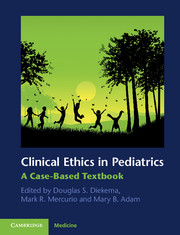Book contents
- Frontmatter
- Contents
- Contributors
- Preface
- Section 1 Core issues in clinical pediatric ethics
- Section 2 Ethical issues at the beginning of life: perinatology and neonatology
- 10 Maternal–fetal conflicts
- 11 Fetal intervention and fetal care centers
- 12 Ripped from the headlines: assisted reproductive technology and multiple births
- 13 Preimplantation and prenatal genetic testing for inherited diseases, dispositions, and traits
- 14 Decision-making in the delivery room
- 15 Withholding and withdrawing life-sustaining intervention from neonates
- 16 The role of quality of life assessments in neonatal care
- 17 Variations of practice in the care of extremely preterm infants
- Section 3 When a child dies: ethical issues at the end of life
- Section 4 Ethical issues posed by advances in medical technology and science
- Section 5 Children, public health, and justice
- Section 6 Special topics in pediatric ethics
- Index
- References
10 - Maternal–fetal conflicts
from Section 2 - Ethical issues at the beginning of life: perinatology and neonatology
Published online by Cambridge University Press: 07 October 2011
- Frontmatter
- Contents
- Contributors
- Preface
- Section 1 Core issues in clinical pediatric ethics
- Section 2 Ethical issues at the beginning of life: perinatology and neonatology
- 10 Maternal–fetal conflicts
- 11 Fetal intervention and fetal care centers
- 12 Ripped from the headlines: assisted reproductive technology and multiple births
- 13 Preimplantation and prenatal genetic testing for inherited diseases, dispositions, and traits
- 14 Decision-making in the delivery room
- 15 Withholding and withdrawing life-sustaining intervention from neonates
- 16 The role of quality of life assessments in neonatal care
- 17 Variations of practice in the care of extremely preterm infants
- Section 3 When a child dies: ethical issues at the end of life
- Section 4 Ethical issues posed by advances in medical technology and science
- Section 5 Children, public health, and justice
- Section 6 Special topics in pediatric ethics
- Index
- References
Summary
Case narrative
LC, a 28-year-old previously healthy woman, presented to the office at 35 weeks’ gestation for a routine prenatal visit. On examination the midwife became concerned about fetal distress, and sent the patient immediately to the Labor and Delivery Unit for further evaluation. On the unit, the obstetrician noted fetal bradycardia, and told the patient that an emergency cesarean section was necessary in order to avoid a very high risk of fetal death or permanent severe neurological disability. Several months ago, in what was then a normal pregnancy, LC had made prior arrangements with a midwife to deliver at home, via a carefully outlined birthing plan, and now strongly voiced those preferences to her medical team. Despite counseling and compelling persuasion from two different obstetricians and the midwife, LC refused a cesarean section. Further, she demanded that she be discharged home or she would leave against medical advice.
Summary of ethical issues
Multiple ethical issues and dilemmas can arise in the care of the pregnant woman, as illustrated by this case. The term maternal–fetal conflict has been widely used to describe situations when pregnant women “reject medical recommendations, use illegal drugs or engage in a range of other behaviors that have the potential to cause fetal harm” (ACOG, 2005). The ethical issues central to these difficult situations include, but are not limited to: a woman’s right to autonomy (“self-rule”), the rights of the fetus and/or future child, justice for both mother and fetus, the mother’s moral obligations, and the physician’s moral and professional obligations. For the case described above, several questions arise. Which ethical obligation or duty takes precedence, the duty to respect LC’s autonomous decision, or the duty to benefit her viable fetus? Can the physician ensure fair treatment towards LC and still promote the well-being of her fetus? And finally, should pregnant women be punished for behavior, such as refusal of a recommended treatment, that ultimately harms their fetus or future child?
- Type
- Chapter
- Information
- Clinical Ethics in PediatricsA Case-Based Textbook, pp. 51 - 56Publisher: Cambridge University PressPrint publication year: 2011
References
- 1
- Cited by

